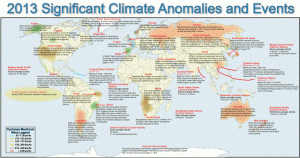
NOAA’s Significant Climate Anomalies and Events
The National Oceanic and Atmospheric Administration (NOAA) published its State of the Climate for 2013, reporting on climate-related occurrences of 2013. The “State of the Climate” is published monthly and recaps climate-related occurrences both nationally and globally. Included in the report is a graphic of “Significant Climate Anomalies and Events,” which maps particular weather episodes of interest. It notes cyclones, areas of abnormal heat, cold, drought, and rainy conditions. Some selected points of interest:
Record Heat
- Greenland (25.9 °C/ 78.6°F), Ghana (43.0°C/109.4°F), South Africa (47.3°C/117.1°F) recorded hottest single day temperatures ever. In South Africa 47.3°C/117.1°F was the hottest temperatures ever recorded in Africa.
- Argentina: second warmest year on record.
- Russia: Warmest November & December, sixth warmest year on record (since 1891)
- South Korea and Japan both had their warmest summers on record.
Record Cold
- United Kingdom: coldest March and May since 1962 and 1996, respectively.
- France: second coldest May on record.
Record Precipitation
- Alaska: 3rd wettest of the last 96 years on record
- Canada: Torrential downpours on June 19th – Canada’s costliest natural disaster with an estimated C$5 billion dollars’ worth of damage.
Record Drought
- California: driest year on record
- Oregon: 4th driest year on record
Other weather events of note:
- Arctic ice was 6th smallest ice extent on record while Antarctica reached its largest sea ice extent since 1979
- Brazil simultaneously had some of the worst drought conditions in the last 50 years in the northeast while having record high amounts of rain in the southeast.
This is an important demonstration that climate change does not affect every point on the earth equally. While the overall average temperature of planet earth is on a warming trend (NOAA reports that 2013 was the fourth warmest year since record keeping began in 1880), localized areas do not necessarily follow this trend. Instead as climate change becomes more severe, weather patterns are more likely to move to the extremes. While we should expect record heat,it does not preclude record cold as well. There will be a dearth as well as excess of rain in different locations. As the climate rapidly becomes more extreme, it threatens the regional environment and way of life developed over decades or even centuries.
The American Security Project has long expressed concern about the security dilemmas the change in weather patterns present. Climate change “will challenge the world’s security architecture to prepare for and adapt to new security challenges, like disaster response, food security, and water availability,” was written in ASP’s “Climate Security Report,” released in 2012. To reinforcing poor economic conditions in Africa to the degradation of infrastructure in the States, Climate Change has affects an untold number of variables vital to US defense.







[…] NOAA’s Significant Climate Anomalies and Events […]
[…] NOAA’s Significant Climate Anomalies and Events […]